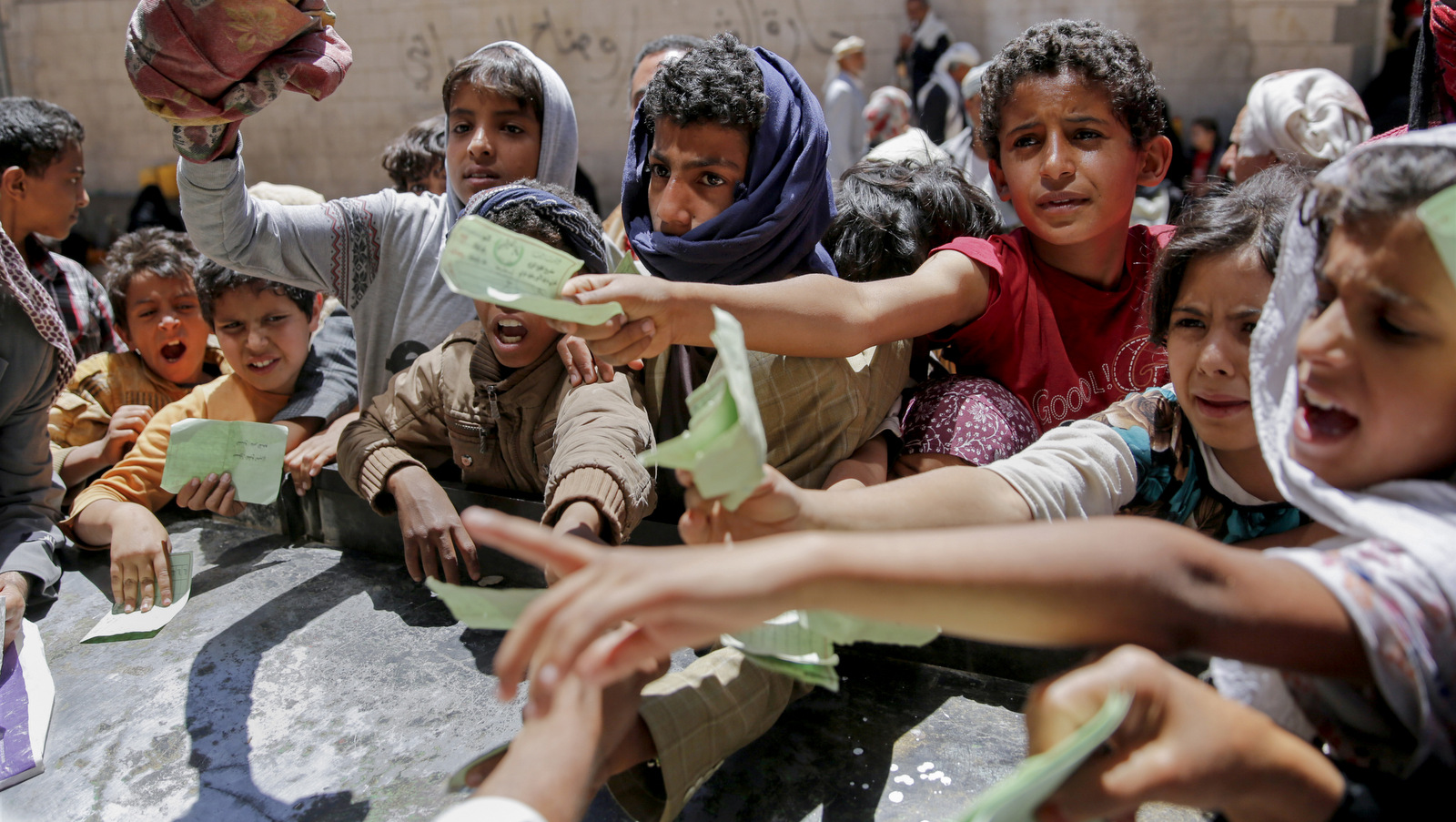In a brief statement issued Wednesday afternoon, President Trump called on Saudi leadership to completely lift the years long Saudi military blockade on war-torn Yemen. The unexpected announcement came on the same day President Trump delivered an extremely controversial televised address wherein he gave official US recognition of Jerusalem as the capital of Israel.
“I have directed officials in my administration to call the leadership of the Kingdom of Saudi Arabia to request that they completely allow food, fuel, water and medicine to reach the Yemeni people who desperately need it,” Trump said through a White House press release. “This must be done for humanitarian reasons immediately.”
Though it’s unclear exactly why the directive was suddenly issued after years of humanitarian catastrophe in Yemen, it is likely connected with the widespread shock and condemnation from world leaders which immediately followed in the wake of Trump’s speech formally recognizing Jerusalem as the Israeli capital. The Yemen directive was published by the Office of the Press Secretary only a matter of two hours later.
And while Trump cites “humanitarian reasons” for the urgent directive requesting the lifting of the siege, Saudi Arabia has enforced a military blockade on deeply impoverished Yemen since it began bombing the country in 2015. Furthermore, media and human rights groups began reporting on the de facto naval blockade of Yemen’s ports – which quickly left over 20 million Yemeni civilians facing a dire humanitarian crisis – soon after the war began in March of 2015. This occurred as the US and UK stationed military and intelligence officers in Saudi command and control centers in order to assist in targeting Yemeni Houthi rebel locations.
As early as June 2015, for example, a Guardian investigation found that the US and UK were enabling the crippling blockade, which has been widely acknowledged as a “humanitarian disaster”. According to the report, “nearly 80% of the population are in urgent need of food, water and medical aid, in a humanitarian disaster that aid agencies say has been dramatically worsened by a naval blockade imposed by an Arab coalition with US and British backing.”


Yemeni children present documents in order to receive food rations provided by a local charity amidst food shortages resulting from a Saudi blockade, in Sanaa, Yemen, April, 13, 2017. (AP/Hani Mohammed)
While it’s clear that the lifting of the siege is a welcome step in the right direction for the millions of suffering Yemeni men, women, and children impacted, the White House decision in reality has nothing to do with humanitarian concerns, as the US itself has for the past two years been partnering with the Saudis in all its actions in Yemen (also including Bahrain, Kuwait, UAE, Egypt, Sudan, and with the UK as a huge supplier of weapons).
Saudi airstrikes on the impoverished country, which have killed many thousands of civilians – a shocking percentage of children among them according to the UN – and displaced tens of thousands, have further involved the use of American military hardware. Cholera has recently made a comeback amidst the appalling war-time conditions, and civilian infrastructure such as hospitals have been bombed by the coalition. Though likely falling short of the true number, as of November 5,295 civilians have been killed and another 8,873 injured in the war, according to figures provided by the UN.
And the coalition’s military campaign greatly intensified this week following former President Ali Abdullah Saleh’s death, which resulted in an uptick in the aerial pounding of Sanaa, which was overrun by Houthi rebels.
So why is Trump belatedly citing “humanitarian reasons” now?
As Middle East analyst Hassan Hassan says, it appears that today’s statement on Yemen is no doubt connected with what many described as the strong and vehement reaction to the earlier Jerusalem recognition move by both King Salman and MBS. “This sounds like a tit-for-tat statement concerning the Jerusalem move. What happened suddenly for this administration to care about Yemenis, esp given recent news the Saudi-led Coalition lifted some of the blockade?” observed Hassan Hassan shortly after the release of the Yemen directive.
This sounds like a tit-for-tat statement re Jerusalem move. What happened suddenly for this administration to care about Yemenis, esp given recent news the Saudi-led Coalition lifted some of the blockade? pic.twitter.com/xrtBjqkeBa
— Hassan Hassan حَسَنْ (@hxhassan) December 6, 2017
No doubt, Trump understands how he can leverage regional allies on the issue of human rights anytime they don’t fall in line with the US position – he knows where the skeletons are buried as the US has long been in the trenches with Saudi Arabia and other Gulf allies during the region’s “regime change” wars in places like Libya and Syria. But this goes the other way too, as we previously predicted of the recent Qatari-Saudi diplomatic war which resulted in both sides accusing the other of human rights abuses and aiding terrorism in the region: “the United States itself will not be spared in this new open season of airing dirty laundry as old allies turn on each other.”
So while Trump suddenly and conveniently puts Saudi Arabia in the hot seat using human rights as an excuse, we should expect that Saudi Arabia will itself eventually retaliate, likely through some kind of leak or media interview.
Trump has already received an immense amount of pushback over his decision to recognize Jerusalem as the Israeli capital by moving the US embassy there. The countries condemning the move include the UK, France, Germany, Canada, Russia, China, Turkey, Saudi Arabia, Qatar, UAE, Egypt, Jordan, as well as the EU and Arab League.
Top photo | U.S. President Donald Trump boards Air Force One for Israel from Saudi Arabia, the next stop in his international tour, at King Khalid International Airport, May 22, 2017, in Riyadh. (AP/Evan Vucci)
<!–
–>
Source Article from http://www.mintpressnews.com/whats-behind-trumps-decision-to-condemn-the-saudi-blockade-of-yemen/235317/
Related posts:
Views: 0
 RSS Feed
RSS Feed

















 December 8th, 2017
December 8th, 2017  Awake Goy
Awake Goy 
 Posted in
Posted in  Tags:
Tags: 
















